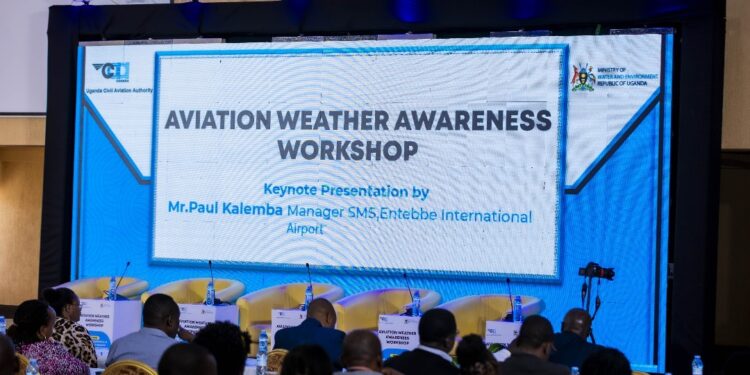The Uganda Civil Aviation Authority (UCAA), in partnership with the Department of Meteorological Services (DMS) under the Ministry of Water and Environment, has opened a two-day Aviation Weather Awareness Workshop aimed at strengthening coordination between meteorologists and aviation professionals to improve flight safety and operational efficiency.
Speaking at the Imperial Golf View Hotel in Entebbe, UCAA Director General Fred Bamwesigye stressed that aviation safety depends heavily on accurate, timely, and reliable weather information.
“Our mission at UCAA is safety, safety, and safety,” he said. “We must ensure stakeholders have access to precise meteorological data and the ability to interpret and use it effectively.”
Bamwesigye highlighted Uganda’s growing air traffic, with aircraft movements at Entebbe International Airport rising from 21,584 in 2021 to 32,552 in 2024.
He urged stronger partnerships between meteorologists, airlines, airport operators, and regulators to ensure that forecasts lead to proactive safety measures.
Representing the Ministry of Water and Environment’s Permanent Secretary, Dr. Bob Alex Ogwang, Commissioner for Meteorology, applauded Uganda’s investment in modernizing meteorological infrastructure, including upgraded weather radars, wind-shear detection systems, and the PUMA forecasting platform.
He cautioned, however, that climate change is increasing the frequency and severity of hazardous weather events.
“Our role as meteorologists is not just to predict but to provide actionable information that is fully integrated into aviation decision-making,” Dr Ogwang said.
He called for enhanced early warning systems, adoption of advanced technologies such as artificial intelligence, and closer collaboration among all aviation stakeholders.
The General Manager of the Directorate of Airports and Aviation Security echoed the theme of collaboration, noting that weather hazards from thunderstorms to low visibility require constant vigilance.
He encouraged participants, including pilots, air traffic controllers, airline operators, and ground handling agents, to actively share experiences and develop solutions during the workshop.
Over the two days, delegates will discuss interpreting meteorological data for flight planning, safeguarding aerodromes from weather hazards, and building institutional and individual capacity to address climate-related risks.
Organizers expressed hope that the workshop will mark a milestone in advancing aviation weather preparedness in Uganda and across the region.









